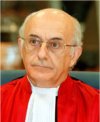
By:
Tyler Church, Legal Intern, International Judicial Academy
One
of the most distinguished jurists in international criminal law, Antonio
Cassese was a statesman, academic and judge. Judge Cassese is best known for
his tireless efforts as the first President of the International Criminal
Tribunal for the former Yugoslavia and later as the President of the Special
Tribunal for Lebanon, where he presided until 2011. In addition to his service
to the various international courts, Judge Cassese was also a professor and
author publishing many publications on the subject of international law.
Born
in 1937 in the small southwestern town of Antripalda, Italy, Cassese graduated
with a law degree at the University of Pisa and then went onto become a
professor at the University of Pisa, as well as Florence University and the
European University Institute. Judge Cassese then moved on to become a visiting
fellow at All Souls College, Oxford University and a visiting professor for the
Graduate Institute of International Studies in Geneva. He continued to guide
many generations of young lawyers throughout his career as a judge and
diplomat, retiring from the University of Florence in 2008.
Amidst
all of his professorships, he also became one of Italy’s delegates to the
United Nations Conference on Human Rights in 1968. Once involved with the
United Nations, Judge Cassese served on countless commissions and committees
focusing on Human Rights and international conflicts including the United
Nations General Assembly, Legal Committee in 1974, 1975, and 1978. Throughout
his career Judge Cassese continually served on international delegations and
committees for the next 28 years.
In
addition to his continuous service to the United Nations, Judge Cassese found
time to write over 14 books and articles on various subjects in international
law. Some of his books include the The New Humanitarian Law of Armed
Conflict (Vol. I 1979, Vol. II 1980), Violence and Law in the Modern Age (1988) and Human Rights in a Changing World (1990). His writings helped
mold the international criminal courts and brought attention to some rising
concerns in the international community about the role and direction of international
criminal law.

 International
Judicial Monitor
International
Judicial Monitor